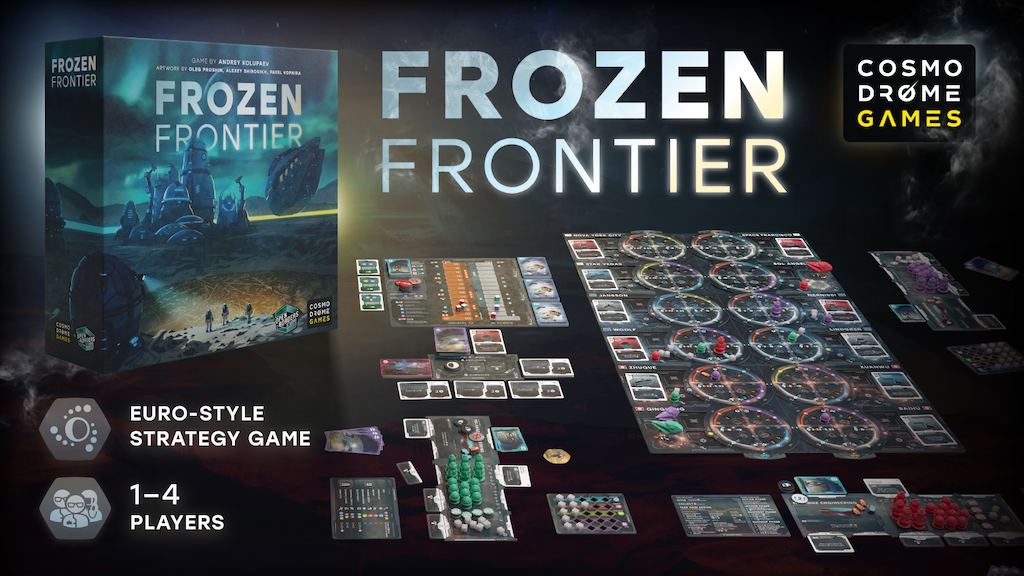⚡️FINAL HOURS ⚡️
over 2 years ago
– Sun, Oct 23, 2022 at 09:53:36 PM
Frozen Frontier has been a very special game for us. We have put much effort into making the game what you can see it in reviews and during the campaign. The gameplay, the lore, the design, the management, and the editing — so many people are a part of this project. We want to thank the developers, our partners, playtesters, and everyone who gave Frozen Frontier a try and a chance to become a reality. We want to thank you, our backers — without you, we couldn't have gone this way at all!
The last 48 hours of the campaign are especially important for us. There are still some locked stretch goals, and we need your support like never before. Share the Kickstarter page with your friends, go for the Deluxe Edition pledge (we have added so much unique content since the beginning of the campaign), and let's unlock the rest together!
Last Unlocked Stretch Goal
During the shipment phase, you can decide to fulfill not standard projects but these. The reward for them is not VP/qubits but a new effect that can be placed under the Chief Officer board (yes, we have unlocked all of them!) We can say that NRI project cards are very satisfying in the game, and we are happy to add new ones to each Deluxe Edition box 🤘
What do the publishers and the developers like the most about Frozen Frontier?
over 2 years ago
– Sun, Oct 23, 2022 at 05:30:52 AM
It's always difficult to choose your favorite aspects of a project you’ve put your heart and soul into, but we surveyed our teams to pull out the four most popular ones and want to share them with you today.
1. Lore. We aimed to convey a sense of serious science fiction, not a space opera. We were inspired by novels such as "The Fountains of Paradise" (Arthur C. Clarke) and "The Moon Is a Harsh Mistress” (Robert A. Heinlein). Our lore is painstakingly constructed and quite realistic. Ivan Tuzovsky, a full doctor of science in cultural studies, is a futurologist and science fiction specialist responsible for developing the Frozen Frontier world. We consulted with physicists, astronomers, arctic construction specialists, economists, political scientists, and lawyers. At some point, we had to move away from scientific reliability in the interest of design and get into the technical requirements of production. Still, we tried our best to take into account the maximum amount of specialists’ recommendations. We hope you will love our world as much as we do.
2. Coexistence of collaboration and competition. There is no negative interaction in the game (no stealing or destruction of an opponent's buildings), but there is a lot of positive interaction. For instance:
- you can place colonists not only in your own but also in other people's buildings, get points for this, and thereby open up the opportunity for everyone at the table to use these scientific and industrial facilities.
- when using other people's buildings, the colonists working in them get paid: we place qubits over them that the building’s owner takes during the income phase. We find it odd that workers work for free in many games, but this has no place on Janus.
On the other hand, the game has intense competition for scheduled shipment cards, project cards in cities, building slots, and resources. You will constantly improve your player board by adding new cards with effects. Often, the player with the most effective board wins.
3. Semi-closed economic model. Janus's economy is a nearly closed economy. Only when interacting with Earth (sending resources or receiving subsidies) do you take qubits from the bank. In other cases, money and resources are constantly circulating within the system.
For example, to pay for construction, you take qubits from the supply and close empty slots on the resource storage board (thus spending both resources and money). To produce new resources, qubits from the storage board are laid out at the involved building on the main board (to pay workers). During the income phase, the building owner will collect these qubits.
4. Straight-forward gameplay. The game is easy to master: move, take a card (if any), perform one of three actions (build, settle/collaborate, raise funds). On a new turn: move, take, perform, etc.
Moreover, these simple actions generate a shock wave of consequences (usually beneficial to the player). Something is constantly happening: you spend qubits/resources, move along the development board and get bonuses (take research cards, shipments, new colonists, etc.), add unique effects to your player board or take subsidies, bringing everything closer to the end of the round. Some of your actions have delayed consequences: for example, the corporation's position on the development board affects how many colonists the player will receive during the clean-up phase and who will be the first to perform the scheduled shipment.











